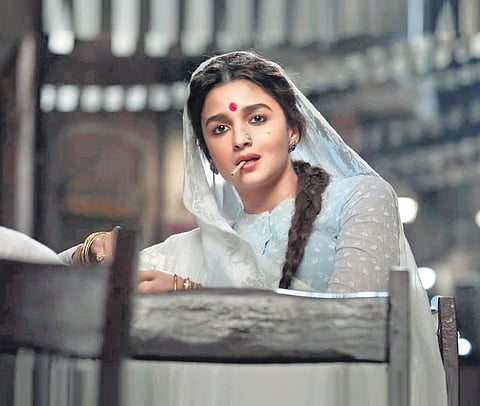

One of the strongest tenets of patriarchy is to burden the woman with the complete responsibility of sex and lay accusations. If it is pre-marital, then the woman gets called a slut. In a marriage, there are accusations of ‘mundhanai la mudiyarathu’. Even in extramarital affairs, the other woman carries more blame than the man involved. In rape too, the frequent response is sadly still that she probably asked for it. Our cultural system absolves the man of responsibility and holds the woman accountable and judges her for the same.
In a way, this bias is at the core discourse in Sanjay Leela Bhansali’s latest film, Gangubai Kathiawadi starring Alia Bhatt in the titular role. “It is men from your localities who come here, but why are we immoral, but not them?” asks Gangubai, in a rousing speech at Azad Maidan. “We are victims, yet we are being punished. We have the right to education, health, and dignified life,” she argues. Gangubai Kathiwadi is inspired by the life of sex worker Gangubai Kothewali aka Gangubai Kathiawadi, one of Mumbai’s influential brothel owners in the 1950s and 60s. The film is based on a chapter from Hussain Zaidi’s book Mafia Queens of Mumbai, which chronicles Gangubai’s life her journey in lobbying for the rights of commercial sex workers.
GK might be a period film, but the conversation around decriminalisation of sex work is still relevant. This is a claim that Gangubai makes as well. The film gives a sensitive peek into the stigma sex workers face and their vulnerability to harassment and violence. Even though the film is focussed on Gangu’s rise, it takes time to acknowledge the shared trauma the community faces. A lot of their stories are similar, but distinct, painful and complex in unique ways—there’s a poignant moment where a group of sex workers write a letter, each adding two lines to finish it. In a way, it is like Gangu and her white saris. For the unsympathetic, they may all seem white. However, each one is different—white like the smoke, cloud, salt, snow, froth, and amid many others, the swan.
Gangu’s rise to power is strictly textbook, in terms of screenplay. But what makes it compelling is the gaze and the object of that gaze. Here, Sanjay Leela Bhansali trades his now-famous golden opulence for melancholy with a noir twist. Take the opening scene, where a young girl is forced into sex work. Or the wordless exchanges between Gangu and her lover Afshan through which SLB shows the indifference they face. In addition, the camera never objectifies them, even when their work demands that the women do it themselves.
And then, there’s the object of that gaze. Alia is phenomenal as Gangu and later Gangubai. There was a lot of scepticism about Alia’s casting, which many found to be unconventional. There is a common image of how a strong woman should look and behave. Petite women are usually pegged ‘cute’, not powerful. But Alia takes down the stereotype with a vengeance. There are a few stereotypes -- the ‘massy’ feet up intro shot, the alcohol. But Gangu is not forced to fit a masculine template of strength and power. Strength, resilience, power, dignity, and vulnerability—Alia brings all of them to the table in perfect measure. It is terrific how she always carries a tinge of sadness, even in the happy moments.
Nevertheless, Gangubai Kathiawadi falls into the same trap that most films inspired by true stories do. The film calls her a mafia queen and says she is not a saint. But we don’t see much of the devil. She is all white, like her sarees. It’s also sad that cis-het actors are still cast in trans roles. The usual reason most creators give is economics. But, even then, the point is to get more queer stories out and slowly progress to a space where the community gets honest and authentic representation. Gangubai is a story about receiving rightful opportunities. Shouldn’t the trans community get the same?